2018 Alumni Award Winners
Bloomberg School alumni have a growing list of accomplishments.

Congratulations to our Bloomberg School 2018 winners!
Check out all the 2018 award winners from across Johns Hopkins University.
Learn More About Our Award Winners
David Celentano, ScD '77, MHS '75
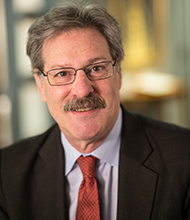
David Celentano, ScD '77, MHS '75
Charles Armstrong Chair of Epidemiology, Johns Hopkins Bloomberg School of Public Health
Heritage Award
David Celentano is an internationally recognized scholar known for his seminal contributions to the epidemiology and prevention of HIV/AIDS and sexually transmitted infections. His research integrates behavioral science theory and research with epidemiology methods in the study of behavioral and social epidemiology. While originally trained in a chronic disease paradigm (alcoholism and cancer control), he began his research in HIV/AIDS and STDs in the early 1980s. He has worked on some of the major cohort studies in HIV epidemiology, as well as conducted intervention research in the USA for heterosexual men and women, injection drug users, and young men who have sex with men.
He turned to international research in 1990, when he began a long-term collaboration with Chiang Mai University in northern Thailand. He has worked on and directed numerous HIV/AIDS and STD epidemiological investigations and preventive interventions, for which he has been recognized with several awards. His current research includes a community-randomized trial of methods to link men who have sex with men with needed health and psychological health services in India, and studies of seek, test, treat and retain drug users with HIV care in India and Vietnam. In addition to mentoring students at the School, he supports doctoral students from Abu Dhabi, UAE and is doing public health practice in the UAE and the State of Qatar.
Currently, he is Professor and Charles Armstrong Chair of the Department of Epidemiology, with joint appointments in the departments of International Health; Health, Society and Behavior; and the School of Medicine.
William Eaton, PhD
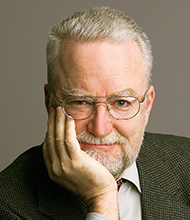
William Eaton, PhD
Former Department Chair, Mental Health, Johns Hopkins Bloomberg School of Public Health
Heritage Award
A leading expert in the field of psychiatric epidemiology, William W. Eaton, PhD, led the Department of Mental Health at the Johns Hopkins Bloomberg School of Public Health for nine years. He has conducted research on the incidence, natural history and risk factors for schizophrenia using data from psychiatric case registers around the world. His groundbreaking work examining the relationship between autoimmune diseases and mental disorders helped shape risk assessment methods for severe mental disorders. His cohort study, the Baltimore Epidemiologic Catchment Area Follow-up, was among the first to determine that major depressive disorder was predictive of the new occurrence of physical conditions such as type 2 diabetes, heart attack, stroke, breast cancer and osteoporosis. More recently, his work has focused on the epidemiology of autoimmune diseases and their relationship to risk for autism, schizophrenia, and bipolar disorder.
Eaton began his academic career at the Bloomberg School in 1983 in what was formerly the Department of Mental Hygiene. He served as interim chair from 2001 to 2003 and was named chair of the Department in 2004, a role in which he honorably served until 2013. His joint appointments in the Bloomberg, Krieger School of Arts and Sciences, and School of Medicine brought new insights and strengths to each division. He has authored or edited nine books, including Public Mental Health, published by Oxford University Press, which was a collective effort of the faculty, students, and fellows of the Department of Mental Health.
Throughout his career as a researcher and a teacher, he has served on numerous advisory panels, received multiple awards, and held significant leadership positions. He has demonstrated an exceptional commitment to the School’s mission and a dedication to advancing research and care for all people with mental disorders.
Elizabeth Fowler, PhD, JD ’96
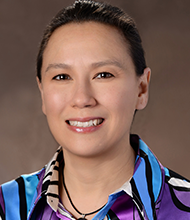
Elizabeth Fowler, PhD, JD ’96
Executive Vice President, Commonwealth Fund
Woodrow Wilson Award
Elizabeth Fowler currently serves as Executive Vice President of programs at the Commonwealth Fund, a nonprofit private foundation supporting independent health policy research to promote a high performing health system that provides affordable quality health care to all. She joined the Commonwealth Fund from Johnson & Johnson where she was Vice President for Global Health Policy. Liz was special assistant to President Obama on healthcare and economic policy at the National Economic Council. In 2009-2010, she was Chief Health Counsel to Senate Finance Committee Chair, Senator Max Baucus (D-MT), where she played a critical role developing the Senate version of the Affordable Care Act. She also played a key role drafting the 2003 Medicare Prescription Drug, Improvement and Modernization Act (MMA). Liz has nearly 25 years of experience in health policy and health services research. She earned her bachelor’s degree from the University of Pennsylvania, a Ph.D. from the Johns Hopkins School of Public Health, where her research focused on risk adjustment, and a law degree (J.D.) from the University of Minnesota. She is admitted to the bar in Maryland, the District of Columbia, and the U.S. Supreme Court. Liz is a Fellow of the inaugural class of the Aspen Health Innovators Fellowship and a member of the Aspen Global Leadership Network. She serves on the board of directors for the National Quality Forum, the National Health Counsel, the Elizabeth Glaser Pediatric AIDS Foundation, and the Winston Fellowship.
Michael J. Klag, MD, MPH ’87
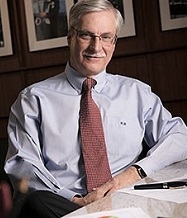
Michael J. Klag, MD, MPH ’87
Dean Emeritus, Faculty, Johns Hopkins Bloomberg School of Public Health
Distinguished Alumnus Award
Michael J. Klag brought to his 12-year deanship of the Johns Hopkins Bloomberg School of Public Health a command of national and global health issues; a passionate commitment to public health education; and an interdisciplinary spirit. During his term as dean, Klag guided the School to unprecedented growth, developed innovative and life-changing research programs and continued to elevate the School as a pacesetting institution of global influence and impact. Confronted by deep cuts to government-funded research during his tenure as dean, Klag led successful initiatives to secure philanthropic support for the School’s lifesaving work. He also made the world’s best public health education accessible to a new global audience by growing the School’s online platforms to develop massive online open courses (MOOCs). In just over four years, enrollment in the School’s MOOCs surpassed 5.2 million.
Additionally, more than 34 new centers and institutes and 12 endowed chairs were established under Klag’s leadership. Klag left the deanship having achieved substantial growth in global collaborations and strategic alliances, student enrollment, online learning, faculty recruitment, philanthropic giving, research centers, alumni engagement and School facilities. Prior to serving as Dean, Klag spent 21 years at the School of Medicine and served in key clinical, administrative and research positions—including vice dean for Clinical Investigation. Klag was already an internationally known expert on the epidemiology and prevention of heart and kidney disease, and often focused on ethnic disparities in patients’ risk for serious diseases.
Alain Labrique, PhD ’07, MHS ’99, MS
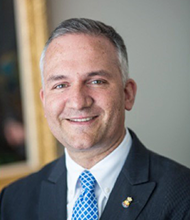
Alain Labrique, PhD ’07, MHS ’99, MS
Director, JHU Global mHealth Initiative; Associate Professor, Johns Hopkins Bloomberg School of Public Health
Distinguished Alumnus Award
Alain Labrique’s research focuses on understanding the mechanisms at the systems, population and pathogen levels that lead to maternal and neonatal mortality and morbidity. Building on this understanding, his work seeks to create and test innovations, leveraging multidisciplinary partnerships, to cost-effectively mitigate the risk factors for preventable morbidity and mortality. His research focuses primarily on underserved populations in Sub-Saharan African and South Asia, with a concentration on his native Bangladesh. He has, over the past decade, concentrated on developing and testing appropriate information and communication technologies (ICTs) that may strengthen gaps in health system performance - targeting both supply- and demand-side challenges.
He received a “Top 11 in 2011” innovator award by the Rockefeller and UN Foundations for his work, and since 2014, has chaired several World Health Organization mHealth / Digital Health technical advisory and guideline bodies. In 2018, he received the Excellence in International Public Health Practice faculty award from the Bloomberg School of Public Health. Today, over 150 Health projects across every division of Hopkins are linked through the JHU Global mHealth Initiative (jhumhealth.org), which Alain founded in 2012. As an overseas faculty member, Alain led one of JHU's largest field research sites in Bangladesh, leading a team of 850+ JHU field staff to study ways to reduce infant and maternal mortality in Bangladesh, many of which have since been scaled up in countries around the world.
Alain is lead investigator in several research projects measuring the impact of mobile information and communications technologies on improving maternal, neonatal and infant outcomes in resource-limited settings. An infectious disease epidemiologist, he serves on the faculty in the Global Disease Epidemiology and Control Program of the Department of International Health. He holds joint appointments in the Department of Epidemiology at JHSPH, the Department of Community-Public Health in the School of Nursing, the Division of Health Sciences Informatics at the School of Medicine, and the Center for Bioengineering Innovation and Design at the Whiting School of Engineering / School of Medicine.
Jessica Ladd, MPH ’11
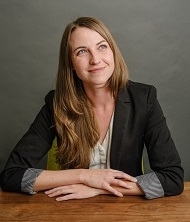
Jessica Ladd, MPH ’11
Founder and CEO, Callisto: Tech to Combat Sexual Assault
Outstanding Recent Graduate Award
Since age 17, Jessica Ladd has been committed to the field of sexual health. Ladd uses technology to combat sexual assault, empower survivors, and advance justice. As the founder and CEO of Callisto, she created an online reporting system designed to empower the reporting experience for sexual assault survivors.
Callisto allows sexual assault survivors to store timestamped documentation of their assault, save it, electronically send the report to authorities, or enter into a Matching System where they automatically report only if someone else reports the same assailant. In a time when 90 percent of sexual assaults are committed by repeat offenders but fewer than 10 percent are reported, the matching system is essential to identifying serial assaulters. Ladd realized that if sexual assault survivors knew their offenders were repeat perpetrators, they were far more likely to report.
Prior to founding Callisto, Ladd worked in the White House Office of National AIDS Policy as a Public Policy Associate, at The AIDS Institute, as a sexual health educator, and as researcher for a variety of organizations. She founded The Social Innovation Lab in Baltimore and was named Civic Hacker of the Year by Baltimore Innovation Week. Ladd is a Skoll Foundation for Social Entrepreneurship awardee, was honored as a Fearless Change Maker by the Case Foundation, a 2016 Ted Fellow, and an Emerging Innovator by Ashoka and American Express.
Debraj Mukherjee, MPH ’08
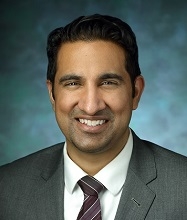
Debraj Mukherjee, MPH ’08
Assistant Professor of Neurosurgery, Johns Hopkins Hospital
Distinguished Alumnus Award
Few neurosurgeons come to the Bloomberg School, but the ones who do are amazing. Raj Mukherjee works to improve treatment outcomes, decrease disparities, and expand access to neuro-oncological care for children and adults with brain and spine tumors. As a medical student at Dartmouth, Raj was a C. Everett Koop Scholar and a health policy fellow under Surgeon General Richard Carmona. He then came to the Bloomberg School as a Sommer Scholar and Albert Schweitzer Fellow.
After earning his MPH in 2008, Raj began his surgical training as a Halsted Intern at the Johns Hopkins School of Medicine and led its Neuro-Oncology Surgical Outcomes Lab. Through residency at Cedars-Sinai Medical Center, he has become a leading national voice at the intersection of neuro-oncology, public policy and the surgical sciences. He was named a Robert Wood Johnson Foundation Health and Society Scholar, and his interdisciplinary work has been featured in leading academic journals including British Medical Journal, Pediatrics, Lancet, Journal of the American Medical Association, and The New England Journal of Medicine.
In July 2018, Raj is joining the Johns Hopkins Hospital as Assistant Professor of Neurosurgery. His significant accomplishments in neurosurgery, oncology, and health care advocacy won him a 2013 Leadership Award from the AMA Foundation. His work continues the Bloomberg School tradition of advancing both the science and practice of public health.
Henry B. Perry, III, MD ’74, PhD ’76, MPH '71
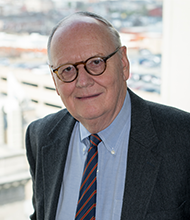
Henry B. Perry, III, MD ’74, PhD ’76, MPH '71
Senior Scientist, Department of International Health, Johns Hopkins Bloomberg School of Public Health
Distinguished Alumnus Award
Henry B. Perry, III is a recognized expert in community-based primary health care, child survival interventions, and NGO-led field programs. His experiences as a student across three Hopkins schools were foundational to his interest in community-oriented primary health care, and his work has laid the groundwork for partnerships with communities around the globe to help them make measurable and sustainable improvements in their health and well-being.
Working with communities to improve their health in the mountains of Bolivia in the 1980s, Perry developed an innovative new approach: the census-based, impact-oriented (CBIO) methodology. Using CBIO, community health workers could determine the major health problems in the community and ensure that everyone, especially those most in need, received essential health services and education. He extended this work by founding Curamericas Global (www.curamericas.org), which has implemented CBIO in seven countries reaching 1.4 million people over the past 35 years. He has lived and worked abroad in more than 15 countries implementing health care programs to save children from dying of preventable diseases.
Capacity building has been a hallmark of Perry’s work. Most recently, he has helped with the establishment of the new International Institute for Primary Health Care in Ethiopia. In 2017 he completed a 15-year effort that engaged students and colleagues from around the world to develop an evidence base for the effectiveness of community-based primary health care in improving maternal, neonatal and child health. He is an author of more than 175 publications and has received numerous awards for his work.
David Peters, MD, DrPH '93, MPH '89
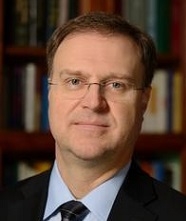
David Peters, MD, DrPH '93, MPH '89
Department Chair, International Health, Johns Hopkins Bloomberg School of Public Health
Global Achievement Award
David Peters is an internationally renowned expert health systems who has worked as a researcher, policy advisor, educator, manager, and clinician in dozens of low and middle-income countries (LMICs). He was one of a few health workers to stand with President Obama in October 2014 when he praised heroes serving on the front lines of the Ebola epidemic. Peters led a group of faculty from the schools of Public Health, Nursing, and Medicine to re-focus the outbreak strategy on community-based responses, contributing to a quicker end to the epidemic in Liberia.
Peters’ work seeks to improve the performance of health systems in LMICs through implementation science, and by building institutional capacity and creating innovations in organization, technology, and financing of health systems. He pioneered Sector Wide Approaches in health, a strategy now commonly used by countries to define and implement national strategies and the allocation of foreign aid. In India, he led a research program with local researchers, government, and civil society to examine health systems and inequities, which became the basis for the Rural Health Mission and policies to improve access and financing for health care. In Afghanistan, he created the first nationally implemented Balanced Scorecard to assess and manage health services and conducted research that directly led to the end of user fees in primary care facilities.
Peters has served as advisor to the World Health Organization, the Global Fund to Combat AIDS, Tuberculosis, and Malaria, and the World Economic Forum, among many other organizations.
Keshia Pollack Porter, PhD ’06
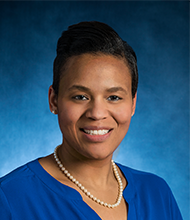
Keshia Pollack Porter, PhD ’06
Professor, Department of Health Policy and Management, Johns Hopkins Bloomberg School of Public Health
Distinguished Alumna Award
Keshia Pollack Porter’s research uses injury epidemiology and health impact assessments (HIA) to advance policies that create safe and healthy environments where people live, work, play, and travel. Her research involves identifying risk factors for, and strategies to prevent, injuries related to occupation, sports and recreation, physical activity, transportation, and the built environment. She is committed to advancing policies that achieve health equity.
She recognized the potential for HIAs to improve lives, which she has demonstrated in her own work with the Health Impact Project, a collaboration of the Robert Wood Johnson Foundation and The Pew Charitable Trusts. In 2013, she conducted a HIA to help members of Congress debating the Farm Bill consider how health could be impacted by changes to the Supplemental Nutrition Assistance Program. Pollack Porter also leads the CDC-funded Physical Activity Policy Research Network Plus (PAPRN+), a national network of Centers advancing policies that promote physical activity.
Keshia has received several awards including an Advising, Mentoring, Teaching Recognition Award (AMTRA) from JHSPH, in both 2011 and 2014, and the APHA Injury Control and Emergency Health Services Section Mid-Career Outstanding Service Award in 2012. In 2011, she was selected by the Daily Record as one of the 40 under 40 in Maryland, and in 2014 by the Baltimore Sun as one of 50 Women to Watch in Maryland. Her passion and tenacity to engage and inform decision-makers in the science of how policies can impact health, along with her talent to build partnerships and create change, make her a standard-bearer in the public health arena.
Fadia Shaya, PhD ’94
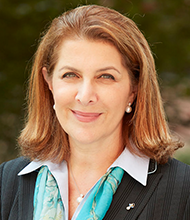
Fadia Shaya, PhD ’94
Professor and Vice-Chair for Academic Affairs, University of Maryland School of Pharmacy
Distinguished Alumna Award
Fadia Tohme Shaya’s work focuses on building strategic partnerships with community, patients, providers and health systems to promote fair access to medications and medical devices, and the proper use of prescription drugs. Using a combination of bio-informatics and community-based participation, she has built a program of evidence-based research that is customized to diverse populations, helping reduce disparities. She addresses the clinical translation and dissemination of research into policy and practice with a focus on advocacy, city and state legislation.
Working with Medicare and Medicaid programs and managed care plans, she helps inform drug payment decisions. With support from the FDA, she leads public forums to include the patient and community voice in drug and medical device development and in building national surveillance systems. She currently leads a large federal-state funded program on preventing substance abuse and the misuse of prescription drugs. Her team also leverages large databases, to study epidemiological indicators of substance use and its consequences, to help local health departments in their needs assessment, capacity building, strategic planning, and implementation.
She is a board member of AcademyHealth and serves on federal study sections. She has served as advisor to numerous professional, doctoral students and post-doctoral fellows, and has refereed over 500 papers, and published over 200. As Vice-Chair for Academic Affairs, she helps lead her School curriculum design, implementation and continuous assessment. Her international experience has helped apply winning strategies to local solutions.
In her words: “Think global, act local” always holds true.
Jaclyn Tuncellito Range, MPH ’14
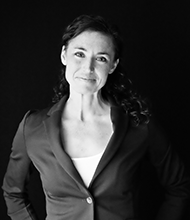
Jaclyn Tuncellito Range, MPH ’14
Executive Director, Back on My Feet Baltimore
Community Hero Award
As the first executive director of the Baltimore chapter of Back on My Feet, Jackie oversees development, operations, and management for the hundreds of clients and volunteers served by the local organization. The Baltimore chapter is one of twelve across the country combatting homelessness through the power of running, community support and essential housing and employment resources. Back on My Feet is a SOURCE community partner, providing meaningful community involvement opportunities for the JHU health professional schools.
Recognizing that incarceration, addiction, and homelessness are three of the most highly stigmatized and pervasive issues facing Baltimore, Range is working with a team to take bold strides in creating a space that nurtures empowerment, self-sufficiency and equity. Under her leadership, every dollar invested in the organization returns nearly $2.50 to the local community through increased economic output from employment and reductions in costs for shelter, medical services, incarceration, and drug and alcohol treatment.
She and her team measure their success not only by the health impact of miles run, but also by how many individuals obtain education, employment and housing. Now she is working to broaden the scope of Back on My Feet Baltimore’s Alumni Association, tracking long-term Alumni success, and better measuring the program’s qualitative outcomes to draw a more definitive correlation between the physical element, the community structure and the components that drive members to move their lives forward toward stable jobs, education and sustainable housing.
Previously, Jackie spent two years as a high school teacher and coach on the island of Chuuk in the Federated States of Micronesia with the Jesuit Volunteer Corps. Upon returning to the States, she coached cross-country and track at her undergraduate alma mater, Loyola College.
